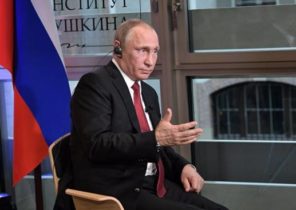
This is a question that is discussed in London constantly and at all levels — in banking and shopping, buses, and political discussion sites. The Economist does not cease to perform variations on a theme of problems of the European Union, especially after the decision of the UK to leave. Although until recently this Union, the British represented an unwavering, firmly cemented. In the last article of the Economist, experts have tried to describe the threat landscape, which, as always, the British are portrayed with panache and a private, insular ideas about continental Europe.
The authors of the article write that when on 25 March 1957 signed the Treaty establishing the international club of the new sample, which included six countries, it is unlikely the founding fathers of the European Union could imagine that it will become widespread, the number of member countries increased to 28. However, immediately the British notice that with all this, now gathering in Rome for the celebration of the 60th anniversary of the European Union, the leaders of the organization realize that their project is experiencing serious difficulties.
British experts propose to speculate and predict the factors of external and internal threats to the stability and prosperity of the Union. In their opinion, from the point of view of internal policy shortcomings that have become apparent during the Euro crisis, still remain. In particular, prolonged economic difficulties contributed to a drop in the level of support for the European project. Populist, anti-EU parties tend to jeopardize the very existence of the European Union, primarily in France: it is alarming the fact that the leader of the national front party marine Le Pen (Marine Le Pen) has made significant progress during his presidential campaign, though expect her victory in the presidential elections in may still not worth it. The most serious consequence of anti-European protest was a British exit from the EU. The Prime Minister, Theresa may, did not participate in the “party birthday” on March 25 in Rome; on may 29 it has activated Article 50 of the Lisbon Treaty on the start of Brassica. In the next two years negotiations on withdrawal from the EU will require a lot of time and effort; moreover, the loss of such a large member is a serious blow in influence and credibility.
British experts record their views on the seriousness of the existing external pressure on the EU. So, they believe that although today the acute phase of the migration crisis is behind us, but this was achieved mostly thanks to the questionable transaction of the Europeans with Turkey. And, they say at a time when Russia led by President Vladimir Putin resumes, how to imagine the British so-called “its aggression” and the us leader Donald trump does not feel enthusiastic about the EU and NATO, the European Union, according to their belief, it is impossible to be weak and fragmented. Bitter irony, British experts is the fact that the project aimed at supporting post-war security in Europe, can give slack at the exact moment when this safety is, in their opinion, is under threat, and says, ostensibly about how much is at stake if Europe cannot solve its problems.
The traditional answer of euroenthusiasts such challenges require decisive move towards “ever closer Union” that involves the extension of the powers of the Central government in Brussels that the European bureaucrats will actively strengthen EU borders and a common voice to broadcast their approaches leaders like Putin and trump. However, British experts note with sarcasm that just the current realities in European societies indicate that no European electorate or their elected governments do not want. Anyway, all it is quite obvious that the European public prefers the opposite.
And if “ever closer” Union is not possible, argue the experts, it is possible — according to the old tradition of Brussels — with barely operate the old: wave of the Euro crisis for the most part subsided, the peak of immigration had passed, and Bracket one way or another, take place. And if, as predicted in London this year in the presidential election in France will win Emmanuel macron (Emmanuel Macron), and the Chancellor of Germany is elected Angela Merkel or Martin Schulz (Martin Schultz), the Club will provide a robust Pro-European leadership. However, they also warn that the lack of European leaders a clear plan is fraught with certain risks. Thus, the renewed financial crisis, leading to the weakening of the Euro, or the election of a government determined to hold a referendum about the exit of another country of the EU or Eurozone, could certainly lead to a dissolution of the Union.
The Economist asks the question: is there a better alternative? According to Brits, out of the current situation — to begin the transition to a more flexible arrangement of the European Union. Speaking of “Newspeak” of European bureaucrats, introduce “tiered/multi-speed system,” in which the countries of Europe in the broader sense of the word in a different way follow the political course of the EU and can easily move from one level to another.
Recently there has been considerable interest in the idea of a “Multispeed Europe”. Under this most European leaders implies that the key members of the organization must be able to follow the General political course in areas such as defence, taxation and social policy; this concept implies that all members of the club are moving in the same direction. In a broader, “multi-tiered” Europe will be a place for countries outside the EU. All on the European continent 48 countries, home to 750 million people; while in the EU, where the 28 countries, home to 510 million Europeans in the Eurozone only 340 million inhabitants of 19 countries.
British analysts believe that the new “core” Europe would be the countries using the common currency. To solve the problems of the European currency requires deeper integration and common institutions — from full-fledged banking Union and ending total debt instrument. To the next more freely-defined level could be the member countries of the EU, are not ready to sacrifice their sovereignty for the sake of joining the Eurozone, some countries may not do this for many years, others never.
British experts, as always give your recipes and tips. They write: a multi-level Europe should be attractive for very different countries. No need to change old contracts — it is sufficient to change the mind; in the language of the Eurocrats, it is necessary to make the menu à la carte (FR. as you wish — approx. ed.) and not the prix fixe (FR. fixed price — approx. ed.). For Brussels it sounds like a curse: there is the idea that countries can choose to create his or her own “program” of EU membership, is frowned upon, but this is exactly what more and more Europeans want. Countries such as Norway or Switzerland, I want to tightly integrate into a single market. Others, such as the UK, are not willing to accept the rules of the single market, but still I want the same freedom to trade with EU countries. We can assume that they would like to increase its role in areas such as defence and security. Countries such as Turkey, the Western Balkan States, Ukraine and Georgia, might prefer similar associate status instead of the current unsatisfactory situation when they hear assurances that they meet all the requirements, but I know that to become members of the club they would never allow it.
In order for this system to work, Europe needs a pragmatic approach to the formulation of the rules that exist for each of the levels. Those who are part of the “outer circle”, for example, may not assume obligations to ensure the free movement of people, but this is not a reason to deprive them of access to the single market of the EU. The status of “second level” belonging to the countries outside the “core” should not stigmatisierung: in the end, this includes such successful countries like Denmark and Sweden. Need to find a form in which the countries that possess military or diplomatic force (for example, UK after Brassica), can be members of a European foreign and defence Alliance.
In conclusion, the Economist confidently asserts that in order for the European project remained “afloat” for the next 60 years, you need to offer more flexible conditions for anyone seeking greater integration and those who seek to increase their autonomy. Now the European Union beyond the UK, and perhaps in the future someone wants to leave the Eurozone. To carry out this procedure in any case will not be easy. And concludes that rejecting the idea of differentiation, the EU is exposing itself to the risk of collapse.







